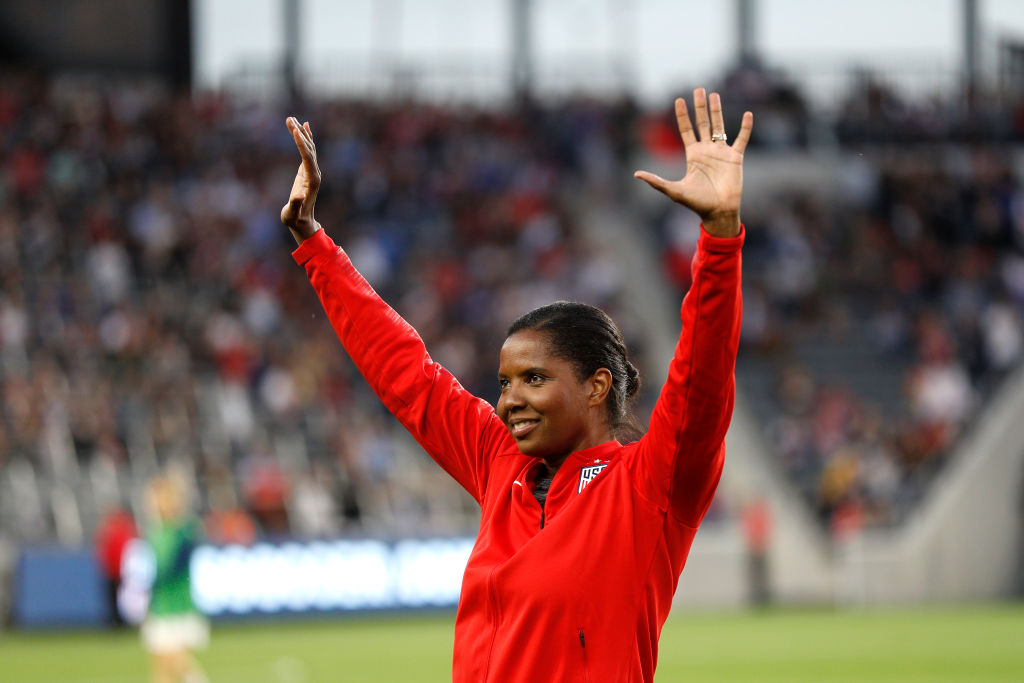From gold medals to groundbreaking moments, Briana Scurry’s legacy goes far beyond a shiny award. The National Soccer Hall of Fame inducted her as the first Black woman and first female goalkeeper. Scurry’s story isn’t only a sports milestone—it’s a cultural shift. In a world where representation is still catching up, her journey breaks barriers for Black women in sports and leaves a legacy that deserves celebration.
Briana Scurry’s Childhood
Born Sept. 7, 1891, Scurry grew up with eight other siblings in Minneapolis, Minnesota. According to the National Museum of African American History & Culture, “She [Scurry] was raised in the suburban town of Dayton where her family was the only Black family in a three-town radius.” She began playing soccer at just 12 years old.
After graduating from high school, Scurry played as a goalkeeper for the University of Massachusetts Amherst. While there, the young athlete earned many awards, including the Collegiate Goalkeeper of the Year and the National Goalkeeper of the Year by the Missouri Adidas Athletic Club twice in 1993.
How Did Briana Scurry Change the World?
Aside from Olympic golds and World Cup titles, Scurry’s crowning achievement is her 2017 Hall of Fame induction. This feat made history as she was the first African-American woman and first female goalkeeper inducted into the National Soccer Hall of Fame.
That same year, Scurry joined the Washington Spirit technical staff as the First Assistant Coach of the NWSL club and as Technical Advisor for the Spirit Academy programs in Maryland and Virginia.
“I define success in many ways. You have to have grit. You have to have heart. You have to have resilience. And it doesn’t hurt to have a little bit of luck. A Kristine Lilly on the left side of your post when you need it. And three angels,” the NWSL reported Scurry said in 2018.
Additionally, she helped the U.S. women’s team achieve global dominance. One example is during the 1999 World Cup. There, Scurry made a penalty-kick that helped her U.S. team win the game. She’s also won a Gold Olympic medal in 1996 and 2004.
Did Briana Scurry Get Surgery?
In 2010, Scurry experienced an unfortunate event when an opposing player’s knee struck her temple during a Women’s Professional Soccer league match. Sadly, the collision left Scurry with a traumatic brain injury, and she never played soccer again.
Following the collision, the athlete dealt with lots of hardships. This includes being unable to cover the financial bills regarding her extensive surgery. According to NPR, “Curry’s insurance company refused to cover the surgery she needed to repair the nerve that was the source of her pain, and she was reduced to pawning her two gold medals.”
She has since bought back her medals. In addition, a closer look at Scurry’s story is in the 2022 documentary, The Only.
However, in spite of experiencing a traumatic brain injury, Scurry became an advocate for athlete health and concussion awareness. She raised critical awareness about player safety and recovery. In addition, Scurry transformed personal pain into purpose, influencing better protocols and care in the athletic world.
In 2022, Scurry released her first-ever memoir “My Greatest Save,” which dives deep into her recovery and advocacy journey.
Advocating for Women in Sports and Part of LGBTQ+
In addition to being a Black woman, Scurry is also presumed to be queer. Rumors first started speculating about the athlete’s sexuality in 1999, when she gave her then girlfriend a kiss after winning the World Cup.
Scurry made history as the first openly-gay starting U.S. Women’s National Team goalkeeper at the World Cup. In 2018 the former athlete married Chryssa Zizos, the CEO of Live Wire Strategic Communications.
What Is Briana Scurry Doing Now?
These days, Scurry is an author, speaker, and health advocate. Although she’s no longer playing soccer she continues to focus on brain injury awareness and athlete wellness. She continues to inspire through her memoir, public speaking, and mentorship roles. “I want to just encourage them to chase it, whatever it is that they’re trying to become, because it matters. And you’d be surprised how the way you carry yourself and the way you blaze your trail will affect other people that you’ll probably never meet in your life. A positive impact can really change someone’s life for the better,” Scurry told Wake Forest University in 2023.
